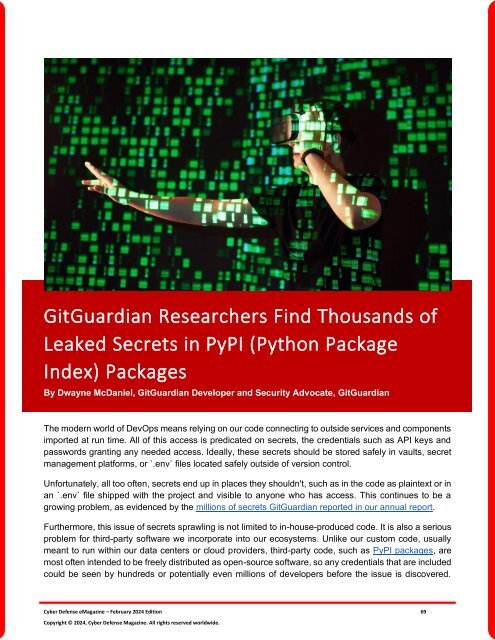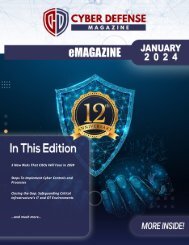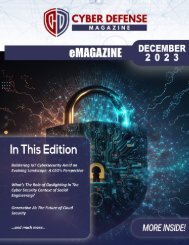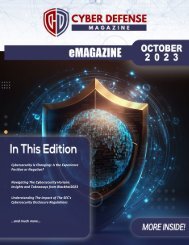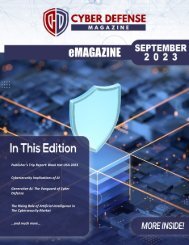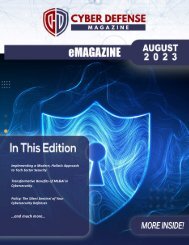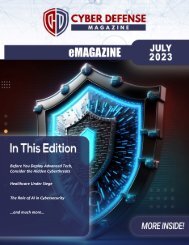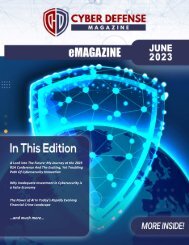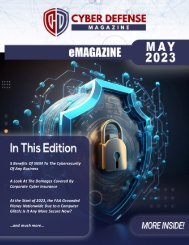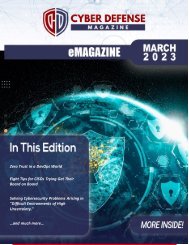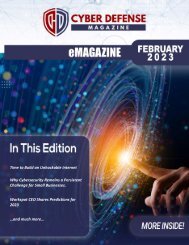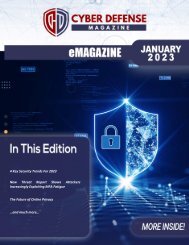The Cyber Defense eMagazine February Edition for 2024
Cyber Defense eMagazine February Edition for 2024 #CDM #CYBERDEFENSEMAG @CyberDefenseMag by @Miliefsky a world-renowned cyber security expert and the Publisher of Cyber Defense Magazine as part of the Cyber Defense Media Group as well as Yan Ross, Editor-in-Chief and many more writers, partners and supporters who make this an awesome publication! 155 page February Edition fully packed with some of our best content. Thank you all and to our readers! OSINT ROCKS! #CDM #CDMG #OSINT #CYBERSECURITY #INFOSEC #BEST #PRACTICES #TIPS #TECHNIQUES
Cyber Defense eMagazine February Edition for 2024 #CDM #CYBERDEFENSEMAG @CyberDefenseMag by @Miliefsky a world-renowned cyber security expert and the Publisher of Cyber Defense Magazine as part of the Cyber Defense Media Group as well as Yan Ross, Editor-in-Chief and many more writers, partners and supporters who make this an awesome publication! 155 page February Edition fully packed with some of our best content. Thank you all and to our readers! OSINT ROCKS! #CDM #CDMG #OSINT #CYBERSECURITY #INFOSEC #BEST #PRACTICES #TIPS #TECHNIQUES
You also want an ePaper? Increase the reach of your titles
YUMPU automatically turns print PDFs into web optimized ePapers that Google loves.
GitGuardian Researchers Find Thousands of<br />
Leaked Secrets in PyPI (Python Package<br />
Index) Packages<br />
By Dwayne McDaniel, GitGuardian Developer and Security Advocate, GitGuardian<br />
<strong>The</strong> modern world of DevOps means relying on our code connecting to outside services and components<br />
imported at run time. All of this access is predicated on secrets, the credentials such as API keys and<br />
passwords granting any needed access. Ideally, these secrets should be stored safely in vaults, secret<br />
management plat<strong>for</strong>ms, or `.env` files located safely outside of version control.<br />
Un<strong>for</strong>tunately, all too often, secrets end up in places they shouldn't, such as in the code as plaintext or in<br />
an `.env` file shipped with the project and visible to anyone who has access. This continues to be a<br />
growing problem, as evidenced by the millions of secrets GitGuardian reported in our annual report.<br />
Furthermore, this issue of secrets sprawling is not limited to in-house-produced code. It is also a serious<br />
problem <strong>for</strong> third-party software we incorporate into our ecosystems. Unlike our custom code, usually<br />
meant to run within our data centers or cloud providers, third-party code, such as PyPI packages, are<br />
most often intended to be freely distributed as open-source software, so any credentials that are included<br />
could be seen by hundreds or potentially even millions of developers be<strong>for</strong>e the issue is discovered.<br />
<strong>Cyber</strong> <strong>Defense</strong> <strong>eMagazine</strong> – <strong>February</strong> <strong>2024</strong> <strong>Edition</strong> 69<br />
Copyright © <strong>2024</strong>, <strong>Cyber</strong> <strong>Defense</strong> Magazine. All rights reserved worldwide.


